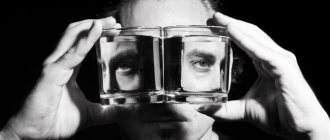Consultation via Skype or WhatsApp is available.
A panic attack is a sudden, uncontrollable attack of severe, “peak” anxiety that has no real and justified cause. This condition is accompanied by severe fear and bodily symptoms - rapid heartbeat, shortness of breath, heaviness and pain in the chest, excessive sweating, trembling in the body.
Such attacks can occur not only during the day, but also at night. There is no control of consciousness in sleep - anxiety can manifest itself in threatening, frightening dreams, or it can manifest itself as a panic attack. During the day, a person keeps all emotions to himself, but at night, control weakens, and an attack occurs. Panic attacks in a dream have a certain danger to human health; one should not neglect or underestimate the possible adverse consequences. Quality sleep is a necessary condition for complete restoration of physical and mental strength. During an attack, there is a sharp awakening with a painful feeling of anxiety and fear, accompanied by the same bodily symptoms: rapid heartbeat, shortness of breath, heaviness and pain in the chest, excessive sweating, trembling in the body. Several such nights - and this will lead to a deterioration in general well-being, irritability, decreased performance, i.e. quality of life will be lost.
Panic attacks during sleep provoke the development of insomnia. It seems to a person that if he does not sleep, this will help avoid an attack. Going to bed is delayed for various reasons. The very thought that you need to go to bed soon causes anxiety and fear.
Such attacks can occur in children, adolescents, and adults; People who have a more sensitive emotional system are most susceptible to them. It is not always possible to immediately recognize that this condition is a panic attack in sleep, but the fact that the quality of night sleep suffers is a serious argument for consulting a psychiatrist or psychotherapist.
This condition is closely related to both biological and psychological causes; it is a disorder that requires professional help from a psychiatrist or psychotherapist.
Causes
Biological reasons may be due to the fact that the endocrine glands begin to release large amounts of adrenaline into the blood. This hormone is normally produced in extreme situations that threaten human health or life. It is this that influences the acceleration of all physiological reactions, that is, the heartbeat quickens, the sweat glands and lungs begin to work harder. This is how the body prepares to defend or escape from a mortal threat.
But why does this hormone begin to be released during sleep, when a person is safe and not in danger? The answer to this question is not yet completely clear. Most likely, there are individual psychological reasons here - for example, increased personal anxiety as a character trait: most often, attacks occur in suspicious, emotionally vulnerable and anxious people. It is they who are most prone to self-flagellation and long experiences of life events; and/or negative experience of relationships in the past, in which a person acquired such qualities as distrust, suspicion, lack of internal, psychological permission to relax (“you can’t lose control for a minute, you can’t relax - otherwise something irreparable will happen”).
Provoking factors for panic attacks at night during sleep are:
- Chronic drinking or drinking too much alcohol before bed.
- Severe stress.
- Childhood psychological trauma.
- Hormonal disorders.
- Exhaustion of the nervous system due to constant worries and stress.
- Hereditary predisposition to anxiety disorders.
- Traumatic brain injuries.
- Work activity that involves constant emotional stress or risk to life.
According to statistics, about 50% of people diagnosed with neurosis or vegetative-vascular dystonia suffered from nighttime panic attacks.
Night screams during sleep in adults
Sleep-speaking (somniloquy) is a common and harmless parasomnia. A person talks in his sleep or even shouts certain phrases loudly, but in the morning he does not remember anything. The attack lasts about half a minute with a high probability of recurrence.
The problem affects approximately 6% of the world's population. The majority of patients are not older than 16 years. The risk group includes people who abuse bad habits, do not maintain sleep hygiene, or have a hereditary predisposition.
The severity of the failure depends on the causative factor. Children scream because of nightmares, and mutter incoherent sounds when faced with a large volume of incoming information. In adulthood, emotional shock comes to the fore. The situation is aggravated by taking medications, alcohol and constant stress.
Characteristic manifestations of the phenomenon
Somniloquy is usually divided into 2 types. The first type is characterized by the pronunciation of clear phrases during the rapid stage of sleep, and the second type is characterized by incoherent sounds during the slow stage. Sleep talking rarely mirrors dreams and occurs to varying degrees. Relatives of the patient can promptly find out about the presence of parasomnia by the following signs:
- The sleeping person turns to someone or begins to call for help, which creates the appearance of awakening.
- Words are spoken in a whisper or in a loud voice. Speech is clear or unintelligible depending on the stage of sleep.
- A person begins to scream, wake up in the middle of the night, cry and wave his arms if he has a terrible dream. The situation is aggravated under the influence of drugs, drugs or alcohol.
- The sleeper, without waking up, is able to get out of bed, scream or ask something from relatives. Characteristic manifestations of somnambulism.
The problem is rarely identified on its own, since in the morning the patient does not remember anything. They learn about this type of disorder from people sleeping next to them, who are forced to constantly hear screams, unintelligible sounds and conversations at night.
Finding the reason
Experts in the field of neuropathology and psychiatry believe that screams during sleep occur against the background of excessive stimulation of the nervous system. Perhaps the patient often drinks coffee before bed or watches horror movies in the evenings. In second place are the consequences of the accumulation of negative emotions due to regular exposure to stressful situations. If you don’t learn to relax and throw out the negativity, psychosomatic problems will begin to develop over time. A general list of reasons why people scream in their sleep is given below:
- Nervous overexcitation. Frequent swearing, bad habits, fear of certain factors, disruption of daily biorhythms, watching horror films and taking tonics contribute to the development of parasomnia. Due to the combination of irritants, nightmares appear, interfering with sleep and provoking sleep talk and sudden awakenings.
- Fear under the influence of external factors. You can scream in fear in a dream due to noise, shaking and other sudden and loud actions.
- Taking medications. Disruptions in the sleep-wake rhythm develop under the influence of strong psychotropic drugs. Sleepy speech occurs when treatment is abruptly stopped or at the beginning of treatment.
- Mental disorders. Many variants of parasomnia are common in mentally ill people.
- Impact of alcohol. A drunk person tosses and turns and screams in his sleep due to disproportionate inhibition of parts of the brain. The glitch is especially pronounced when you have nightmares.
- Failure to meet healthy sleep criteria. Stuffiness, ambient noise, light in the eyes and other irritants reduce the quality of rest. Gradually, due to lack of sleep, various types of failures develop.
Symptoms
Panic attacks occur during the deep sleep phase - between 2 and 4 am. In rare cases, this condition occurs immediately after falling asleep.
Symptoms of panic attacks during sleep include the following:
- sudden sudden awakening from a feeling of anxiety and intense fear;
- lack of air;
- difficult intermittent breathing;
- increased sweating;
- tachycardia;
- increased blood pressure;
- feeling of paralysis or stiffness of the body;
- dizziness;
- chest pain;
- chills, numbness of extremities.
In time, a night attack lasts from 10-20 minutes. Due to paralyzing horror, a person is unable to call for help. Sometimes awakening occurs from one's own scream. The darkness in which a person finds himself only aggravates his condition. Therefore, panic attacks at night during sleep have more severe symptoms than during daytime attacks.
In the first 5-10 minutes after a sudden awakening, confusion and disorientation in space occurs. Then comes awareness of the situation. The person is trying to calm down his pulse and calm down. Feelings of anxiety and fear may persist for several days, intensifying in the evening. This is due to the fear of falling asleep and again falling into an overwhelming nightmare.
A panic attack during sleep also has intrusive thoughts (so-called obsessions). There is a fear of serious illness, death, heart attack in a dream. Without appropriate treatment, attacks may become more frequent and occur every night.
Reasons for concern
Screaming at night stops in children under 16 years of age. If the problem remains relevant or worsens, you will need the help of a neurologist. The specialist will check the child for neurological disorders. If there are no failures, the patient will be redirected to a somnologist and psychotherapist to draw up a picture of sleep and examine the psyche. In some cases, it is urgent to take action before the stated deadline. The following list of alarming symptoms will help you get your bearings in a timely manner:
- regular night awakenings due to nightmares;
- increased activity of sweat glands;
- development of enuresis or encopresis;
- manifestation of sleepwalking;
- detection of symptoms of shortness of breath;
- temperature rise above 38°;
- identifying cases of body shuddering during rest;
- manifestation of teeth grinding;
The voiced situations cannot be left to chance. Alarming symptoms may indicate the development of serious pathological processes. The patient needs to be urgently examined to draw up an optimal treatment regimen and prevent dangerous consequences.
Help with panic attacks
A person suffering from panic attacks at night cannot correctly assess his condition. Often waking up with a feeling of fear and anxiety is perceived as an ordinary nightmare, so they are in no hurry to seek help. But such episodes are becoming more frequent, and my health is getting worse. If panic attacks occur during sleep, treatment should only be prescribed by a psychiatrist or psychotherapist. At the initial consultation, the doctor collects an anamnesis. Only sincere answers and a confidential conversation with a doctor will help you make a correct diagnosis and choose the optimal therapy. The main goal of conversations with a doctor is to learn to quickly recognize your panic attack and, over time, learn to cope with it, learn to help yourself, gain personal experience of successfully overcoming, coping, and thereby minimize the risk of its reoccurrence.
For a sleep panic attack, symptoms and treatment vary. With a high level of anxiety, as well as with severe or frequent attacks, a course of anti-anxiety (anxiolytic) drugs has a good effect. Medicines are selected individually, and only with the consent of the patient.
If a panic attack occurs in a dream, how to deal with it without pills?
At the onset of the disease, relaxation and muscle relaxation techniques help to quickly calm down and normalize the nervous system. This is taught in psychotherapy sessions. Breathing techniques, therapeutic hypnosis, and cognitive behavioral psychotherapy are also effectively used.
Individual and then group psychotherapy is an important stage in the treatment of panic attacks. A person needs to figure it out and understand what makes up his individual causes of anxiety attacks during the daytime. Learn to respond adequately to various stressful situations. Find your own individual regimen that makes up a healthy lifestyle, strictly follow the recommendations of your doctor. Only in this case will the prognosis be favorable.
Night screams during sleep in adults: causes and solution to the problem
Talking in your sleep is considered parasomnia. In medicine, the phenomenon is called somniloquy. The problem most often affects children who have not reached puberty. Experts attribute the failure to the development of the nervous system and a weakened psyche. With age, the condition should normalize on its own. If an adult screams in his sleep, the reasons may be more serious. Psychologists' advice, folk remedies and medications are used as treatment. The doctor is obliged to draw up a course of therapy, focusing on the diagnostic results.
Treatment for alcoholic hallucinosis
Treatment for hallucinosis is possible only in a psychiatric department of a hospital. The patient is under constant observation.
The body is detoxified and injections of antipsychotic drugs (Haloperidol, Aminazine, Relanium) are given.
The patient is given vitamins B and C and antidepressants. After eliminating the acute state of hallucinosis, treatment for alcoholism is carried out, aimed at eliminating cravings for alcohol. If the alcoholic is not treated, the symptoms of alcoholic hallucinosis will recur. It will be impossible to leave such a person unsupervised.
Alternative opinions
Presence of other people
It happens that in the presence of some people a person always sleeps calmly, but next to others he begins to scream. In such a situation, it can be assumed that next to the first category of people a person feels safe, while the presence of others nearby, on a subconscious level, causes him irritation or anxiety.
If the doctor has not identified any pathologies, then simple sleep hygiene will help you get rid of screaming in your sleep.
Alcohol abuse
Many people wonder why, having not previously encountered the symptoms of parasomnia, they begin to scream in their sleep if they drank alcohol the night before. Experts explain that the state of intoxication is somewhat similar to anesthesia, in which inhibition in different parts of the cerebral cortex occurs unevenly. That's why a drunk person yells in his sleep when the speech centers are disinhibited. Alas, in this case there is only one way to get rid of screaming: do not drink alcohol at night.
Lack of sleep hygiene
To stop screaming in fear, you need to stop having nightmares in your sleep. The dreamer may have a bad dream not at all because of an excess of stress in real life. Often a person overstimulates his nervous system at night by watching horror films or replaying frightening future scenarios, as a result of which he dreams of a nightmare, which is a reproduction in a dream of the direction of thinking chosen the day before.
You need to maintain sleep hygiene:
- It is better to avoid watching films that arouse the emotional state, and do not study new information late in the evening. Instead, it is advisable to take a walk in the fresh air.
- Before going to bed, you can make a foot bath with the addition of soothing oils: lavender, rosemary, ylang-ylang, rose, orange.
- You need to go to bed at the same time.
- To get rid of restless thoughts, you can turn on calm music in your player or a recording of auto-training for relaxation.
- It is recommended to sleep on a pillow filled with hops or chamomile.
Screaming in a dream is only in rare cases a symptom of serious illness. However, if in the absence of obvious stress and physical exhaustion the attacks do not go away, it is advisable to consult a doctor for advice.
How to stop screaming?
To get rid of nighttime screams, you can contact a specialist who will prescribe appropriate treatment.
You can also follow preventive measures, as well as some ways to normalize rest at night, on your own.
If you contact a specialist, you will most likely be prescribed complex treatment :
Remember that only a doctor can prescribe active medications.
Alternative medicine involves the use of herbal remedies with a mild calming effect:
People prone to allergic reactions should use alternative medicine treatment methods with extreme caution.
The following methods will also help:
Be sure to take into account that work time alternates with rest - in order to avoid overloading the body.
Try to distract yourself from your problems at this time and focus on your own peace and relaxation.
Sleep is an important component of proper rest . A sleeping person regains not only his physical strength - first of all, normal sleep is important for the proper functioning of the nervous system.
Types of alcoholic psychoses
There are the following types of psychoses that occur in alcoholics:
With delirium tremens, excitement gives way to lethargy and insomnia occurs.
In a state of hangover, so-called acute alcoholic hallucinosis occurs, when after a heavy libation a person cannot remember what happened to him. A hangover syndrome is accompanied by severe headache and nausea. In this case, a person may experience auditory, visual, and taste hallucinations. In order to get rid of this condition, he needs to take a small dose of alcohol.
Psychologist's advice
If a person screams in a dream, this may be a sign of a subconscious desire to express his emotions in reality to some person. Showing negative feelings is rarely welcomed in society. A person, for various reasons (upbringing, fear of punishment, secondary benefit) tries to hide his true emotions from others, and often he successfully hides them from himself. It could be fear, rage, resentment, irritation. In this case, only by realizing and openly expressing your feelings can you get rid of sleep problems.
To begin with, you can use “safe” methods, for example, opening up to a friend or writing a letter to a person, expressing everything in it, and then burning it. If necessary, the process can be repeated until the parasomnia symptoms disappear.
For those people who do not fully understand why they scream in their sleep, what emotions they suppress, psychologists recommend doing the following exercise.
- Take a comfortable, relaxed position, close your eyes, and even out your breathing. Find one of the most pleasant and joyful memories in your memory and enjoy it.
- Then you should remember your feelings after waking up. What is it – fear, anxiety, malice, anger? Where are these feelings located in the body? How can they be described by visualization? Color, size, smell, weight?
- If these emotions could talk, what would they say?
As a rule, at this stage it becomes clear what a person is afraid of or what makes him angry.
What to do when screaming in your sleep, when psychotherapy does not help and the attacks are severe:
- drug treatment is recommended (taking sleeping pills and sedatives, nootropics under the supervision of a doctor);
- physiotherapy (massage, mud therapy, relaxing baths, electrosleep);
- vitamin therapy (taking B vitamins, magnesium, fatty acids, tryptophan).
Relatives of someone screaming in their sleep should remember that it is impossible to wake them up abruptly during an attack. Due to a sudden awakening in the REM phase of sleep, a person ultimately does not get enough sleep. This may lead to worsening of the disorder in the future. It is better to speak soothing words, stroke the person’s hand, quietly call him by name until he gradually wakes up or falls asleep peacefully further.
Forms of alcoholic hallucinosis
Usually, if an alcoholic comes to his senses after an attack of delirium tremens, the next stage of the disease may occur - alcoholic hallucinosis.
With constant drinking of alcohol, hallucinosis can become chronic, characterized by alternating violent behavior with depression. After heavy drinking, this condition can last for months. Hallucinosis in alcoholism can occur in the form of delirium and be accompanied by depression. A person talks with imaginary interlocutors, gesticulates, hears threatening voices. Often he imagines that obscene expressions are used, after which a corresponding response appears.
In some cases, on the contrary, he becomes dangerous to others, since he imagines that they are his enemies. An imaginary voice calls him to murder.
At the first stage he appears:
In the second stage of the disease, fears go away, after which the mood changes:
At the third stage, he develops not only auditory hallucinations (voices), but also visual ones:
Treatment for hallucinosis is possible only in a psychiatric department of a hospital
He lives in his hallucinations, confuses dreamed events with reality, talks about incredible incidents that happened to him, and still hears different voices.
If a given person does not die, then irreversible dementia remains.
Prevention of disturbances in the sleep-wake rhythm
The development of parasomnia can be stopped by eliminating exposure to irritating factors. The patient must establish a sleep-wake schedule, create a suitable environment for relaxation in the bedroom and follow the recommendations of doctors. It’s easier to focus on the general list of tips:
- To refuse from bad habits. Alcohol-containing drinks, drugs and cigarettes have a detrimental effect on the body. If you cannot stop yourself, you should contact specialized institutions.
- Creating comfortable conditions for relaxation. A person should feel relaxed in the bedroom. It is necessary to try to create a quiet and darkened environment with an air temperature of 18 to 22° and a humidity of up to 50-60%.
- Try not to excite the nervous system in the evening. A few hours before rest, it is recommended to stop working at the computer and watching TV. Only moderate physical and intellectual activity is allowed. Instead of coffee and energy drinks, it is better to drink tea or a herbal decoction with a sedative effect. Shortly before bed, you can walk down the street, listen to relaxing music, read a book or take a bath.
- Follow the schedule. You need to go to bed and wake up at the same time. Failure to comply with the rule will lead to disruption of daily biorhythms and lack of sleep.
- Don't overeat before bed. It is advisable to take the last meal 2-3 hours before rest, otherwise digestive problems will arise.
Screams in sleep are considered a common manifestation of excessive stimulation of the nervous system. In the absence of other irritants, it is enough to follow the advice of specialists to normalize the psycho-emotional state. If the problem is the development of pathologies or addiction to harmful substances, you should definitely consult a doctor.
Treatment Options
On their own, patients can try to eliminate exposure to external irritants and use available methods of calming the nervous system. This advice is relevant if there are no warning signs. In other cases, you will need the help of a doctor. The course of therapy may include the following treatment options:
- traditional methods;
- folk recipes;
- advice from psychologists.
The treatment regimen will have to be combined with sleep hygiene. Treatment is aimed at stopping the causative factor and eliminating discomfort.
Traditional medicine
Traditional methods are used if the malfunction is difficult to eliminate simply by following the rules of healthy sleep. A somnologist prepares a course of treatment based on the results of the examination. A treatment scheme with 3 integral elements is presented:
- taking vitamin complexes;
- undergoing physiotherapeutic procedures;
- the use of drugs to calm the nervous system.
Folk recipes
Traditional medicine rarely causes adverse reactions and can be easily prepared at home. It has a sedative effect thanks to lemon balm, valerian, hawthorn and other natural ingredients. The following methods are suitable for normalizing sleep:
- Herbal infusions with a sedative effect eliminate nervous excitement. The medicine is prepared from 1-2 tbsp. l. collection (hawthorn, valerian, peppermint), poured with 500 ml of boiling water. After 20 minutes of infusion, you should discard the raw materials and leave the liquid. Take ½ cup morning and evening.
- Inhaling relaxing aromas calms the nervous system. The patient needs to pour lavender, chamomile and lemon balm in equal parts into a cloth bag and place it under the pillow or next to the bed.
- Warm water with 1 tsp added. Honey perfectly relieves nervous tension. It is enough to drink 1 cup of sweet drink before bed.
- Evening foot baths allow you to relax and forget about your problems. The effect will be improved by adding essential oils, pine needles and chamomile to warm water.
Most methods are relevant for treating representatives of any age group.
Recommendations from a psychologist
Screams in a dream are regarded by experts as a manifestation of suppressed emotions. In real life, many people cannot fully express dissatisfaction, irritation, and resentment due to the disapproval of such demonstrations by society. Gradually, negativity accumulates, which leads to the development of parasomnia.
Is it dangerous
Restless dreamers themselves, as a rule, upon awakening do not remember anything about what happened and do not want to see a doctor, while their loved ones are very frightened by night attacks. They are often the first to wonder why a person screams at night in his sleep.
Although in most cases night screams are a completely harmless thing, this condition in children should still be monitored with special care. As a rule, this behavior is one of the phenomena of parasomnia - a specific sleep disorder, most widespread among children under the age of 8-10 years. However, such screams may be a sign of increased epiactivity of the brain. If the situation is chronic and does not go away with age in the child (by 14-16 years), then it makes sense to consult a neurologist. If the neurologist does not identify any violations, then in order to figure out why the person screams and talks in his sleep, he will be sent for a consultation with a somnologist and psychotherapist. The somnologist will draw up a picture of the dream, and the psychotherapist will examine the patient’s state of mind for abnormalities that could cause problems.









